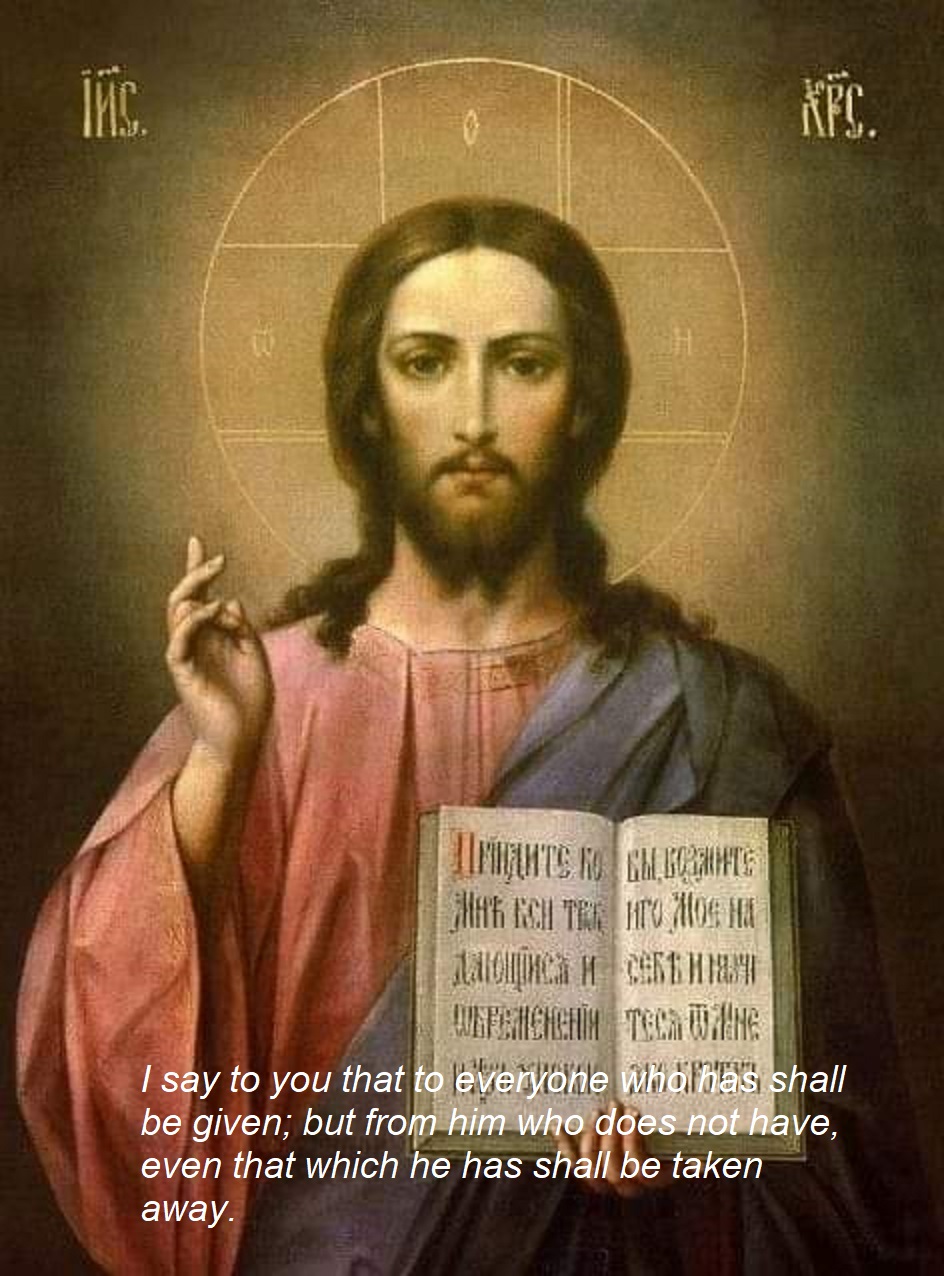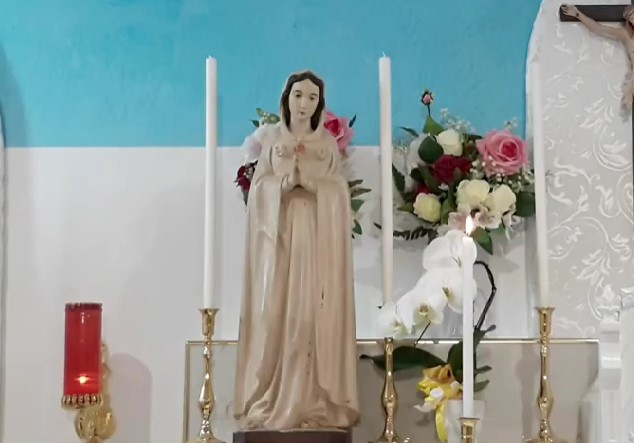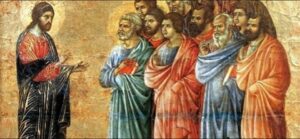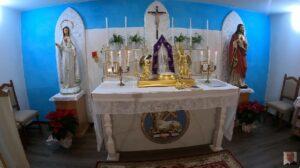
I say to you that to everyone who has shall be given; but from him who does not have, even that which he has shall be taken away.
ORARI S.MESSA DI VENERDI 2 SETTEMBRE 2022, ORE 18.00:
S. Stephani Hungariæ Regis Confessoris ~ III. classis
Tempora: Feria Sexta infra Hebdomadam XII post Octavam Pentecostes IV. Augusti
S.MESSA ONLINE DI DON ENRICO RONCAGLIA, su youtube channel:
https://www.youtube.com/channel/UCYYDj4O4e11cE7XNtngkoJA
e qui:
LITURGIA IN LATINO\ENGLISH:
https://divinumofficium.com/cgi-bin/missa/missa.pl
COMMUNIO PREGHIERE\PRAYERS:
https://www.proselitismodellascienza.it/2021/10/25/communio-e-comunione-spirituale/
EVANGELIUM E OMELIA\HOMILY:
Luc 19:12-26
In illo témpore: Dixit Iesus discípulis suis parábolam hanc: Homo quidam nóbilis ábiit in regionem longínquam accípere sibi regnum, et reverti. Vocátis autem decem servis suis, dedit eis decem mnas, et ait ad illos: Negotiámini, dum vénio. Cives autem eius óderant eum: et misérunt legatiónem post illum, dicéntes: Nolumus hunc regnáre super nos. Et factum est, ut redíret accépto regno: et iussit vocári servos, quibus dedit pecúniam, ut sciret, quantum quisque negotiátus esset. Venit autem primus, dicens: Dómine, mna tua decem mnas acquisívit. Et ait illi: Euge, bone serve, quia in módico fuísti fidélis, eris potestátem habens super decem civitátes. Et alter venit, dicens: Dómine, mna tua fecit quinque mnas. Et huic ait: Et tu esto super quinque civitátes. Et alter venit, dicens: Dómine, ecce mna tua, quam hábui repósitam in sudário: tímui enim te, quia homo austérus es: tollis, quod non posuísti, et metis, quod non seminasti. Dicit ei: De ore tuo te iúdico, serve nequam. Sciébas, quod ego homo austérus sum, tollens, quod non pósui, et metens, quod non seminávi: et quare non dedísti pecúniam meam ad mensam, ut ego véniens cum usúris útique exegíssem illam? Et astántibus dixit: Auferte ab illo mnam et date illi, qui decem mnas habet. Et dixérunt ei: Dómine, habet decem mnas. Dico autem vobis: Quia omni habénti dabitur, et abundábit: ab eo autem, qui non habet, et, quod habet, auferetur ab eo.
Gospel
Luke 19:12-26
At that time, Jesus spoke this parable to His disciples: A certain nobleman went into a far country to obtain for himself a kingdom and then return. And having summoned ten of his servants, he gave them ten gold pieces and said to them, ‘Trade till I come.’ But his citizens hated him; and they sent a delegation after him to say, ‘We do not wish this man to be king over us.’ And it came to pass when he had returned, after receiving the kingdom, that he ordered the servants to whom he had given the money to be called to him in order that he might learn how much each one had made by trading. And the first came, saying, ‘Lord, your gold piece has earned ten gold pieces.’ And he said to him, ‘Well done, good servant; because you have been faithful in a very little, you shall have authority over ten towns.’ Then the second came, saying, ‘Lord, your gold piece has made five gold pieces.’ And he said to him, ‘Be you also over five towns.’ And another came, saying, ‘Lord, behold your gold piece, which I have kept laid up in a napkin; for I feared you, because you are a stern man. You take up what you did not lay down, and you reap what you did not sow.’ He said to him, ‘Out of your own mouth I judge you, you wicked servant. You knew that I am a stern man, taking up what I did not lay down and reaping what I did not sow. Why, then, did you not put my money in a bank, so that I on my return might have gotten it with interest?’ And he said to the bystanders, ‘Take away the gold piece from him, and give it to him who has the ten gold pieces.’ But they said to him, ‘Lord, he has ten gold pieces.’ I say to you that to everyone who has shall be given; but from him who does not have, even that which he has shall be taken away.
DALL’OMELIA DI (FROM THE HOMILY BY) DON ENRICO RONCAGLIA – VENERDI 2 SETTEMBRE 2022, ORE 18.00:

DALL’OMELIA DI DON ENRICO RONCAGLIA (*,1)
Eccli 31:8-11
Beato l’uomo che è trovato senza macchia, che non è andato dietro all’oro, e non ha sperato nel danaro e nei tesori. Chi è costui e gli daremo lode?
Luc 19:12-26
In quel tempo, disse Gesù ai suoi discepoli questa parabola: «Un nobil uomo partì per un lontano paese a ricevere l’investitura d’un regno, e ritornare. Perciò chiamati a sé i suoi dieci servi, diede loro dieci mine e disse loro: “Negoziatele sino al mio ritorno”.
Questo vangelo l’abbiamo sentito per la festa di San Luigi IX. Oggo celebriamo un altro re.
Si tratta di Stefano I d’Ungheria, o santo Stefano d’Ungheria (in ungherese István király, “re Stefano”, o Szent István, “santo Stefano”; Esztergom, 969 – 15 agosto1038). Venerato come santo dalla Chiesa cattolica e ortodossa, fu l’ultimo gran principe degli Ungari tra il 997 e il 1000 o 1001, fondatore dello Stato e della Chiesa magiari dal momento della sua incoronazione avvenuta nel 1000 o nel 1001. Fu il primo sovrano, in particolare Magiaro, ad essere canonizzato come santo.
Fu un grande cristiano che visse la fede eroicamente.
Santo Stefano morì il 15 agosto (nel 1038), festa dell’Assunta. La sua Leggenda riferisce che prima di morire consacrò il suo regno alla Madonna come regina dell’Ungheria.
Anche noi cerchiamo di utilizzare i nostri doni perche’ il Regno di Dio trionfi sulla terra!
Sia lodato Gesu’ Cristo! Sempre sia lodato!
____________________
(*) Questo commento e’ scritto in tempo reale durante l’omelia. Mi scuso per l’eventuale misinterpretazione delle parole di Don Enrico.
(1) La Cappella dei Sacri Cuori e’ d’ora in avanti sotto la protezione della Madonna Pellegrina di Montichiari (Brescia, 1946).
FROM THE HOMILY BY DON ENRICO RONCAGLIA (**,1)
Eccli 31: 8-11 Blessed is the man who is found without blemish, who did not go after gold, and did not hope for money and treasures. Who is this and will we give him praise?
Luke 19: 12-26 At that time, Jesus told his disciples this parable: “A noble man left for a distant country to receive the investiture of a kingdom, and to return. So he called his ten servants to him, gave them ten minas and said to them: “Negotiate them until my return.” We heard this gospel for the feast of St. Louis IX.
Today we celebrate another king. It is Stephen I of Hungary, or Saint Stephen of Hungary (in Hungarian István király, “King Stephen”, or Szent István, “Saint Stephen”; Esztergom, 969 – 15 August 1038).
Venerated as a saint by the Catholic and Orthodox Church, he was the last great prince of the Hungarians between 997 and 1000 or 1001, founder of the Magyar State and Church from the moment of his coronation in 1000 or 1001.
He was the first ruler, in particular Magiaro, to be canonized as a saint.
He was a great Christian who lived the faith heroically.
Santo Stefano died on August 15 (in 1038), the feast of the Assumption. His legend relates that before dying he consecrated his kingdom to Our Lady as queen of Hungary.
We too try to use our gifts so that the Kingdom of God may triumph on earth!
Praised be Jesus Christ! Always be praised!
____________________
(*) This comment is written in real time during the homily. I apologize for any misinterpretation of Don Enrico’s words.
(1) The Chapel of the Sacred Hearts is from now on under the protection of the Pilgrim Madonna of Montichiari (Brescia, 1946).

